We’re back again, with even more great news from our Diversity fund 2021 recipients! In this post, we have updates from Mary Job, Abel Lifaefi Mbula, and David Towoju. They’ve all been hard at work on their projects, helping WordPress to reach their communities and making a real impact by sharing their skills. Keep reading to find out about their progress and future plans.
A catch up with Mary Job
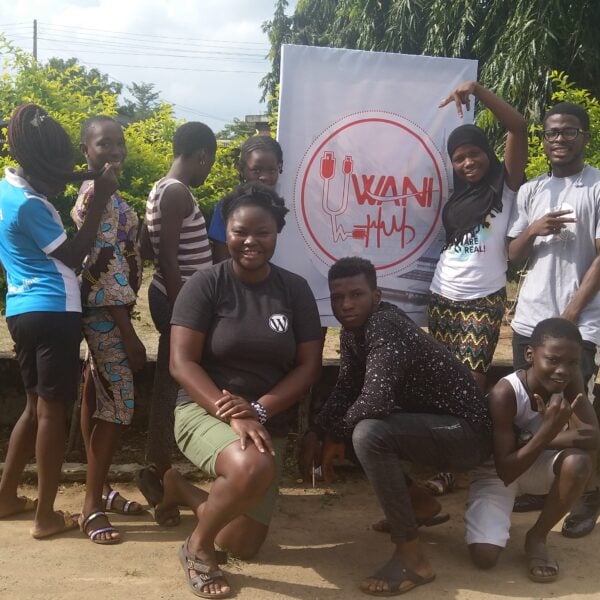
impact on one person, a quality impact,
and others will follow.” – Mary Job
Could you tell us a bit more about yourself?
I am a single mom of one, I work at Paid Memberships Pro, a WordPress membership plugin firm. I own How Do You Tech where we build WP sites and offer WordPress maintenance services at WPSlay.
I started Uwani Hub (a safe space for women and girls to do tech) and I volunteer for the WordPress community and the Salesians of Don Bosco in my spare time. I also now run my parents’ hotel in Ijebu-Imusin where I am from and work with Tunbosun to promote managed WordPress hosting for Africans Gbefunwa.
Can you tell us more about your project?
Uwani Hub began as a little CSR for How Do You Tech in Jan 2018, by contributing to my community introducing and teaching ICT to women and girls, today, we have grown bigger than we intended, are building a bigger hub that will seat at least 30 workstations to enable us to achieve our goals of training 5,000 women and teenagers in the use of WordPress software by the year 2030.
Why did you create this project/program? How did you come up with the idea?
I had just moved back to Ijebu-Imusin from Lagos city, turned an abandoned former bar room in my parents’ hotel into office space, and while renovating this room, I thought to myself, would I be able to make use of this office to its fullest capacity? My answer was “No”, seeing as I was set up to work remotely, I knew I would not use the office full-time, then I thought, why not a tech/creative hub in my town, a space for females to do tech safely, and that was how Uwani Hub began its’ journey.
How has your project added diversity to WordPress and its community?
In my early WordPress days, when I was very active with community event hosting, a lot of people I interacted with would always ask me “why WordPress?”. I was never able to provide an answer I was satisfied with. Today, when asked, I can boldly say this is why you should do WordPress, and be satisfied. While it is easy to say this is why you should do WP, people can see how doing WordPress has impacted my own life.
What I am driving at here is that by personally doing and contributing to WordPress, I have been able to inspire, train, teach, motivate and guide others, teenagers especially, on why WordPress is a tool they want to understand, use and contribute to in their present and near future. Introducing WP to teens is one way to ensure their generation feels included within WordPress.
Are there any lessons that you’ve learned from this project?
A lot, a whole lot. One that stands out is not to try to be a Jack of all trades (or tech), and not to try to focus on what tech is in vogue, but that (tech) which I know and understand to a very large extent, that tech which I am able to get support from its community, support for programs, volunteers, facilitators, etcetera. And for me and Uwani Hub, that tech is WordPress.
To what extent the intended outcomes have been achieved?
I am a patient person and a firm believer in keeping my eyes on my goal, we may not be moving as fast as I would want, but I am very pleased that we are achieving our goals, one teenager at a time. David asked me in an interview once why the year 2030 for our vision 2030 WordPress goal to train 5,000 teens and females. While I could say we want to achieve this in 2 years, that would be unrealistic, as I am only one person, and again, a firm enabler of quality over quantity.
Were there any unintended positive outcomes?
Oh yes, to this there has been a lot, one of this is when Uwani Hub started, we did not intend to focus on teenagers, not at all, our focus was solely on women, but as time proceeded, I realized there was a huge gap to fill when it comes to teaching kids ICT, as most public schools around us, lack the practical aspect of ICT. These kids are taught computer science alright, but having access to a computer lab at school was something the rarely had. My daughter was in a private school, and when I asked her about their computer room, she noted, they barely were allowed to go close to the computer room, much less make use of the computers. This led us to decide to focus more on teenagers (male and female), and less on women (our initial audience).
What does the future of your project look like? Can others contribute to it too?
We hope to for one, finish our new building, focus on women once again, and achieve our vision 2030 WordPress goals of training 5,000 teenagers and women, as well as mentoring, training, guiding, and building our list of 500 contributors to the WordPress ecosystem.
And yes, others can volunteer too at Volunteer With Us – Uwani Hub
What would you love to work on next? Do you have any plans?
Yes, we do, our plans are detailed here: Our Vision 2030 WordPress Project – Uwani Hub. We need to first finish our New Hub building as this is very vital to achieving our goals.
We also plan to improve our model to run the hub to one that is not dependent entirely on grants, but one that can generate funds to run itself in the coming years. We have our sights set on being able to be used as a hub where people can write professional exams, and hopefully get accepted as an accredited center to run government entrepreneurship programs. We have no intention to make participants of our programs pay for what we teach or train them on.
Has working on this project helped your personal development?
Yes. Immensely so, I am a better teacher, more patient, and definitely a better human than I was yesterday from interacting with our teenagers and in my attempts to introduce WordPress to teens.
Do you have any advice for others who want to work on a project like this?
Just do it. You can start small, make an impact on one person, a quality impact, and others will follow.
Is there anything else you’d like to share about your project?
We are open to ideas, feedback, comments on how we can improve, please write to me or reach out to me on social media.
How’s Abel Lifaefi Mbula doing?
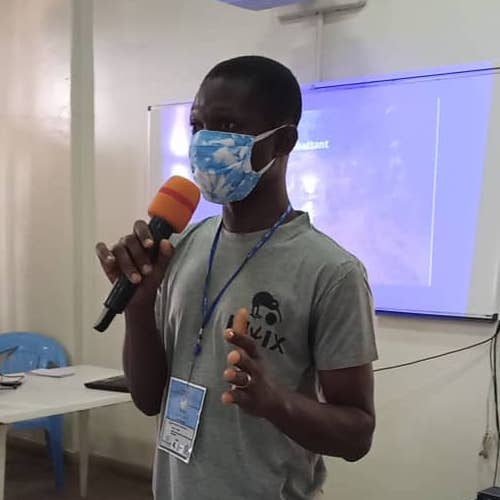
(or has even heard of) WP, is there
diversity? Absolutely not. Our project is an
urgent response to this situation.” – Abel
Lifaefi Mbula
Could you tell us a bit more about yourself?
I am a software developer and a free/libre open source advocate from DRCongo. Since 2015, I have been contributing to Wikipedia and its sister projects. I co-founded the Wikimedia community of DRCongo in order to create awareness of Wikimedia projects among young people in the country. The movement has rapidly grown up and so many other categories of people have joined, like university professors and librarians.
I have contributed to the French translation of Nadia Eghbal book, Roads and Bridges: The Unseen Labor Behind our Digital Infrastructure, which inspired me to found Kali Academy, a coding school for university students, as an urgent response to most of the problems raised by Nadia in her book. With Kali Academy, I want to create awareness among young students to contribute open source code; and I am convinced that the best way to learn programming is with free/libre software.
Can you tell us more about your project?
The project consists of promoting WordPress university students and then contributing back to the whole WordPress community. We have found that many students are not aware of WordPress and all its capabilities. We have identified around 30 students with whom we are working in this phase. Later on, we will be training them on how to create a WordPress theme, which theme will be shared with the entire WordPress community worldwide. The last step will be to use this theme to create a WordPress website for free for non-profit organizations as part of our charity hackathon activity.
Why did you create this project/program? How did you come up with the idea?
First thing first, I’m a FLOSS advocate. When I look around me, I notice that people are not aware of open source in general; and even among university students. So, I decided to do something to promote WP. In short, I want people in my local community to:
- Learn about and be aware of WP,
- Use it, and
- Contribute back to it,
This is what we are trying to do.
How has your project added diversity to WordPress and its community?
This is not a secret, the WordPress community is still struggling with diversity and inclusion. The WordPress Executive Director, Josepha Hadia, said in WordCamp US 2021 That “WordPress can be used by anybody, so it should be built by anybody”. When less the one out of 3 persons knows (or has even heard of) WP, is there diversity? Absolutely not. Our project is an urgent response to this situation. We are promoting WP among students, and other category of people, so that they can use WordPress to build their website, spread the world about it and contribute back to it.
Are there any lessons that you’ve learned from this project?
I think the WP community has much to do, especially Francophone Africa, to make sure diversity is a reality. Although WP is eating internet, there are a great amount of people have never head about it. Contributing to open source is not that easy in Africa. As an events organizer and community leader, I have to think more than once how to convince people to contribute back to open source.
To what extent the intended outcomes have been achieved?
Right now, we can say that they have been achieved at 30%.
Were there any unintended positive outcomes?
Most of those we are working with have never heard of WordPress before.
What does the future of your project look like? Can others contribute to it too?
We would like to see as many people as possible from our area to embrace WordPress first as users than contributors. Also, we are looking for mentors who can speak French.
What would you love to work on next? Do you have any plans?
For now, we still want to continue with the work we are doing, promoting and advocating for WordPress in underrepresented communities in Africa. The more people will get to know about WP, the more they’ll value, and the more they’d be willing to contribute.
We need funds to help us increase the number of WP users in our local community and consequently the number of contributors.
Has working on this project helped your personal development?
Yes, really. I’ve met awesome people, and those with diverse background and culture. I always love the experience of working with new people, seeing new faces in events.
Do you have any advice for others who want to work on a project like this?
Have a passion, love people around you. Think how you can build awesome projects with them included. Diversity and inclusion are what we really want in this world.
Is there anything else you’d like to share about your project?
If you love open source, if you love WP, do support projects in underrepresented community in Africa, Asia, and Latin America. Open source is the future for everyone, WP is the go-to tool for everyone on the internet.
Checking in with David Towoju
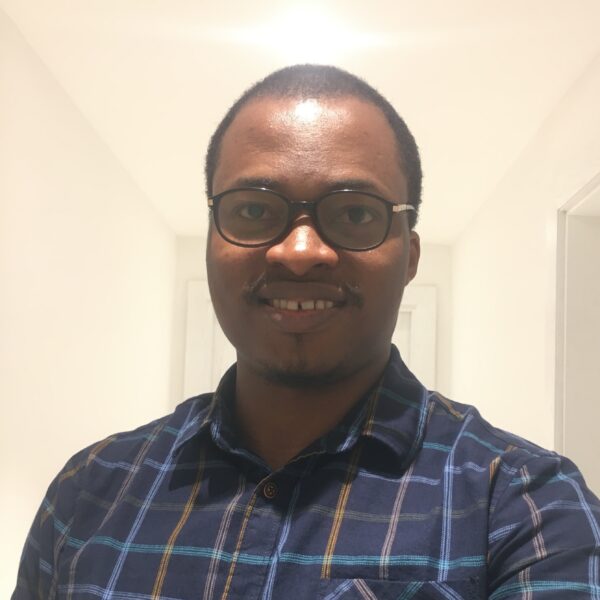
in Africa today, it is more people with more
knowledge of software development. Tech
is the equalizer.” – David Towoju
Could you tell us a bit more about yourself?
My name is David Towoju and I live in Nigeria. I am a self-taught PHP programmer with 10+ years of coding experience. Although I have a background in Law, I am now a full-time product developer. That’s because I have always loved creating things. In fact, it is this desire to create things that pushed me to software engineering and I have never gotten tired of that.
Can you tell us more about your project?
WordPress BootCamp is an interactive training program for Nigerian Youth Corpers. There are a lot of coding schools in Nigeria but this one is different. The goal here is for someone who has real life coding & entrepreneurial experience, not an academic teacher, to pass on this knowledge to a few people who are interested in learning.
The courses taught are HTML, CSS, JAVASCRIPT, REACT/VUE, PHP & WordPress FRAMEWORK. Apart from delivering quality teaching, the program is also 100% free so I could reach out to anyone who actually wanted to learn.
Why did you create this project/program? How did you come up with the idea?
Tech is an instrument of social and economic change and that’s why I decided to devote some of my time to teaching a few Nigerians how to code. There are so many unemployed graduates and my goal is to reduce that number. I want people to leave their Youth Service with skills that can make them self-sufficient and economically stable.
How has your project added diversity to WordPress and its community?
At the core of this program is the goal to teach and train people to be developers and WordPress is part of the tech stack to be taught. So, I believe that teaching people of diverse cultures how to use and build stuff with WordPress is a great contribution to the WordPress community.
Are there any lessons that you’ve learned from this project?
I have learnt that people are eager and passionate to learn something. If given the opportunity, they will exceed expectations.
Another thing is that coding is best learnt thru different sources (websites, methods, etc) and one very important part of learning to code is having someone that can explain something to you. Not everybody can learn everything online, most of the time, you would need someone to explain something that a Codecademy or FreeCodeCamp cannot just do. That’s why StackOverflow is very popular. I give my students assignments but when I explain they get it better.
To what extent the intended outcomes have been achieved?
We have been able to cover HTML, CSS and JavaScript. We will be covering PHP and WordPress in the next couple of weeks. That’s a lot considering the fact that some days were skipped due to availability reasons on either side.
Were there any unintended positive outcomes?
Growing relationships with people is something I always look forward to. I love the fact that I have gotten to know a few more people who are now like my friends. That’s a great one for me.
Also, the size of the BootCamp (less than 10) makes the learning process seem very informal and friendly. For example, I would call out different people’s name as I explain JavaScript functions, “Hey {name}, are you sure you got it?”. I mean, you can’t do that in a BootCamp where you have 100 people.
What does the future of your project look like? Can others contribute to it too?
Well, I hope to finish this round in a few weeks and hopefully by the end of the year start another round. Looking at the challenges of a physical meeting, we might be considering switching to online learning platforms like Zoom.
What I would love to see in the future, as our number increases, are more volunteer developers joining me to teach more people.
What would you love to work on next? Do you have any plans?
I would like to work on the same thing by the end of the year. I am looking at getting all of my students Udemy or Codecademy Pro accounts which they can consult at their leisure.
Has working on this project helped your personal development?
Yes, sure. Teaching people to code makes you a better Developer. I learnt a few things in the process of teaching my students.
Do you have any advice for others who want to work on a project like this?
Go for it! In Nigeria, Africa and in fact all over the world, tech is an instrument of socio-economic change. If there is anything that we need so much in Africa today, it is more people with more knowledge of software development. Tech is the equalizer.
Is there anything else you’d like to share about your project?
These photos:
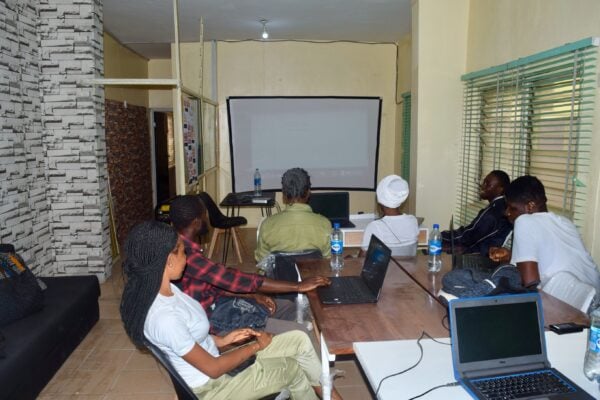
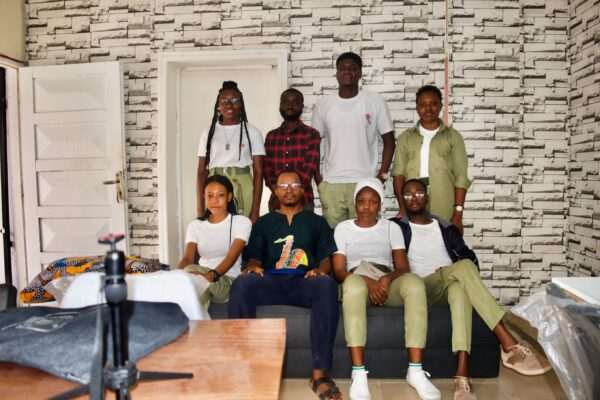
Keep up the good work everyone!
It’s wonderful to see all the amazing work our Yoast Diversity fund recipients have been doing! They’ve achieved so much, creating a deep and valuable impact on the WordPress community. We hope these projects will continue to grow and reach even more people. If you haven’t already ready about the projects from Milana Cap, TC Cazy, and Estela Rueda, be sure to check those out too.
The diversity mission isn’t over
There’s still a lot of important work to be done making WordPress more diverse. Too often we see the same kind of people running the show, while we know there are some people missing from the bigger picture. We’re here to help, but we can’t do it without you! We’ve just opened up applications for the Yoast Diversity fund 2022.
In 2022, we move back to our initial purpose. The Yoast Diversity fund focuses on taking away financial barriers that prevent people from underrepresented groups to speak at tech conferences. We prefer applications for events focusing on WordPress (via a Meetup or WordCamp), TYPO3, PHP, JavaScript, or another Open Source community.
Could you or someone you know benefit from our Diversity fund? Find out more here!
The post Yoast Diversity fund: updates from Mary, Abel, and David appeared first on Yoast.



